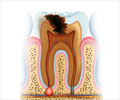Frequently Asked Questions
1. What is tactile stimuli?It is a mechnical stimuli.i.e. when teeth come in contact with some physical object like a toothbrush, fingers, nails and the pain that results in response to the same.
2. What is thermal sesntivity?
Sharp pain in response to any hot or cold food, drink or air that gets in touch with the affected teeth.
3. What is the major and most common cause of dentin hypersentivity?
Faulty tooth brushing is one the most common factors resulting in this condition. Use of hard brushes, brushing with excessive force, excessive scrubbing or lack of brushing causes accumulation of plaque over the tooth resulting in gingival recession. Gingival recession progresses to this condition where a patient’s affected area of the mouth becomes sensitive to all external stimuli.
4. Can this condition be avoided?
Yes, by learning the correct method of brushing from a dental practitioner. Tooth brush and tooth paste need to be used or changed after consulting the dentist because some tooth pastes or powders contain highly abrasive material which might give whiteness to the teeth but can cause abrasions on the tooth surface and are not good for teeth. Brushing should be avoided for at least 2 hours after acidic food or drink intake; instead, gargling should be done to clean the oral surface.
5. What triggers this condition?
Common triggers are cold beverages, hot foods, sugary foods, sour foods, and faulty brushing.
6. Can tooth whitening treatments lead to hypersenstivity?
Tooth whitening treatments involve the use of bleaching agents which can cause sensitivity in some people but not necessarily hypersensitivity. It should be done only under the supervision of a dentist.












